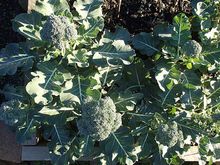 Researchers at the Bio-Protection Research Centre at Lincoln University are quietly optimistic that recently discovered microbes may lead to the development of new biocontrol agents for a major disease and a major pest of both vegetable and forage brassica crops, including cabbage and swede.
Researchers at the Bio-Protection Research Centre at Lincoln University are quietly optimistic that recently discovered microbes may lead to the development of new biocontrol agents for a major disease and a major pest of both vegetable and forage brassica crops, including cabbage and swede.
Black rot is a disease caused by a seed-borne bacterium. Diamondback moth is the world’s major brassica pest, and produces up to twenty generations a year. It is a particular problem as it is now resistant to all chemical insecticides, and it is becoming increasingly resistant to the widely-used bioinsecticide Bacillus thuringiensis or BT. Professor of Seed Technology and Director of the Seed Research Centre John Hampton says ‘Our challenge in all this was to see if we could come up with biocontrol methods for the disease and the pest. We wanted to see if on New Zealand-grown brassica seeds we could find any microbes that would have biocontrol properties.’
After isolating more than 2000 kinds of bacteria and fungi, a process which John Hampton describes as ‘simply looking at what nature has already provided’, the team then tested each of 2000 isolates in petri dishes to see if they had any effects against black rot bacteria. About 50 potential biocontrol agents or BCas were then tested in greenhouse conditions, and two types of bacteria and one fungus showed some biocontrol potential. The project is currently investigating these microbes in the field, and looking more closely at their modes of action. ‘One may be a direct effect on the bacterium causing the disease,’ says John Hampton. ‘The second more likely response is induced resistance within the plant, so we trigger the plant to uplift its own defence mechanism against the pathogen.’
John Hampton told Alison Ballance that ‘we’ve discovered that the BCA is endophytic, so it moves from where we put it on the seed [as a seed coat] into the plant itself, and we’re now trying to see if it moves from the plant to the next generation of seed. If that is the case then that’s almost the perfect answer – because you have your biocontrol agent surviving in the plant and moving through the next generation in seed. That is a big ask.’
Meanwhile, what began as a small addition to the research programme has turned up trumps. Travis Glare, Director of the Bio-Protection Research Centre, says that one of the bacterium isolated in the initial assays has been shown to kill diamondback moths in the lab. There are three strains of the bacterium, and the team have sequenced the whole genomes of each of the three strains and have identified a number of toxin genes to insects. The bacterium kills a range of insects, but is known to be safe to humans as it is already used as a probiotic. Travis Glare says ‘what we have at the moment is a prototype bio-pesticide that has been licensed to an Auckland company Biotelliga.’
The Smart Seeds research programme began six years ago with funding from the Ministry of Business, Innovation and Employment, and involves Lincoln University, Plant and Food Research, Ag Research, Foundation for Arable Research, PG Wrightson Seeds and South Pacific Seeds.

